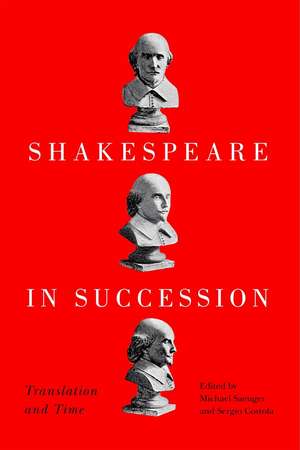Shakespeare in Succession: Translation and Time
Editat de Michael Saenger, Sergio Costolaen Limba Engleză Hardback – 15 feb 2023
It may certainly be said that nothing can be assumed about Shakespeare: on the one hand, the Elizabethan poet seems to be thriving, with more editions, productions, studies, and translations appearing every year; on the other hand, in a time of global crisis and decolonization, the question of why Shakespeare is relevant at all is now more pertinent than ever. Shakespeare in Succession approaches the question of relevance by positioning Shakespeare as a participant as well as an object of adaptive translation, a labour that has always mediated between the foreign and the domestic, between the past and the present, between the arcane and the urgent. The volume situates Shakespeare on a continuum of transfers that can be understood from cultural, spatial, temporal, or linguistic points of view by studying how the text of Shakespeare is transformed into other languages and examining Shakespeare himself as a kind of translator of previous times, older stories, and prior theatrical and linguistic systems. Contending with the poet’s contemporary fate, Shakespeare in Succession asks how Shakespeare’s work can be offered to the multicultural present in which we live, and how we might relate our position to that of the iconic writer.
Preț: 706.29 lei
Preț vechi: 917.27 lei
-23% Nou
Puncte Express: 1059
Preț estimativ în valută:
135.17€ • 140.59$ • 111.59£
135.17€ • 140.59$ • 111.59£
Carte indisponibilă temporar
Doresc să fiu notificat când acest titlu va fi disponibil:
Se trimite...
Preluare comenzi: 021 569.72.76
Specificații
ISBN-13: 9780228016496
ISBN-10: 0228016495
Pagini: 336
Ilustrații: 6 photos, 4 tables
Dimensiuni: 152 x 229 x 28 mm
Greutate: 0.63 kg
Editura: McGill-Queen's University Press
Colecția McGill-Queen's University Press
ISBN-10: 0228016495
Pagini: 336
Ilustrații: 6 photos, 4 tables
Dimensiuni: 152 x 229 x 28 mm
Greutate: 0.63 kg
Editura: McGill-Queen's University Press
Colecția McGill-Queen's University Press
Recenzii
“Shakespeare in Succession successfully overcomes the traditional division between those who perform and those who study Shakespeare. Highlighting their shared concerns and interests, the book seeks to deconstruct this counterproductive gulf by bringing together the perspectives of theatrical practitioners, of translators, and of literary scholars coming from an impressively diverse array of cultures and traditions. A significant contribution to the global study of Shakespeare and translation.” Oana-Alis Zaharia, University of Bucharest and author of Cultural Reworkings and Translations in/of Shakespeare's Plays
“Although many [chapters] could be read alone, making interesting case studies in translation or contributions to translation theory, the rich discourse created by Saenger and Costola's multidisciplinary presentist focus becomes fully transparent in reading and re-reading the collection as a whole.” Participations: Journal of Audience and Reception Studies
“It is sometimes difficult to identify the warp and woof of a collection so wide ranging in tone and content. This renders the consistent lucidity with which the interpretative pliability of Shakespeare’s works is conveyed even more startling. Those works shine bright across time, place, and the pages of a brilliant volume.” Renaissance Quarterly
Notă biografică
Michael Saenger is professor of English at Southwestern University. Sergio Costola is associate dean of faculty and Corbin Robertson, Jr Endowed Professor at Southwestern University.
Descriere
It may certainly be said that nothing can be assumed about Shakespeare: on the one hand, the Elizabethan poet seems to be thriving, with more editions, productions, studies, and translations appearing every year; on the other hand, in a time of global crisis and decolonization, the question of why Shakespeare is relevant at all is now more pertinent than ever. Shakespeare in Succession approaches the question of relevance by positioning Shakespeare as a participant as well as an object of adaptive translation, a labour that has always mediated between the foreign and the domestic, between the past and the present, between the arcane and the urgent. The volume situates Shakespeare on a continuum of transfers that can be understood from cultural, spatial, temporal, or linguistic points of view by studying how the text of Shakespeare is transformed into other languages and examining Shakespeare himself as a kind of translator of previous times, older stories, and prior theatrical and linguistic systems. Contending with the poet’s contemporary fate, Shakespeare in Succession asks how Shakespeare’s work can be offered to the multicultural present in which we live, and how we might relate our position to that of the iconic writer.
